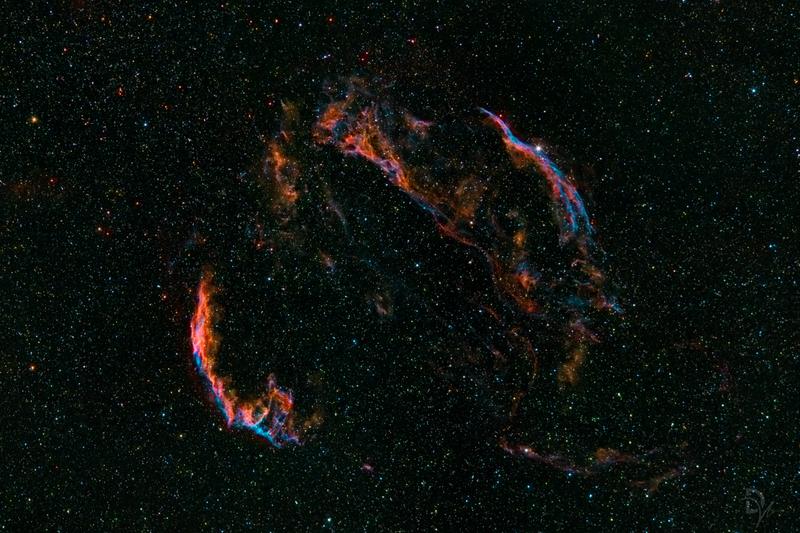
Caldwell 34 - Veil Nebula
The Veil Nebula is a cloud of heated and ionized gas and dust in the constellation Cygnus. It constitutes the visible portions of the Cygnus Loop (radio source W78, or Sharpless 103), a large but relatively faint supernova remnant. The source supernova exploded circa 3,000 BC to 6,000 BC, and the remnants have since expanded to cover an area roughly 3 degrees in diameter (about 6 times the diameter, or 36 times the area, of the full Moon). The distance to the nebula is not precisely known, but Far Ultraviolet Spectroscopic Explorer (FUSE) data supports a distance of about 1,470 light-years. (Source: Wikipedia)
This is my first object captured with all three narrowband filters (Hα, OIII, SII).
Exposure data
| Count | Exposure | Data | Filter | Nights |
|---|---|---|---|---|
| 35x | 300s | Hydrogen-alpha | Astronomik 6nm Hα | 2018-06-26 |
| 33x | 600s | Oxygen-III | Astronomik 6nm OIII | 2018-07-27 / 2018-07-29 |
| 33x | 600s | Sulphur-II | Astronomik 6nm SII | 2018-06-30 / 2018-07-01 |
Total integration: 13 hours 55 minutes
Instrument and equipment
- Canon EF 200mm f/2.8L at f/3.5
- Skywatcher H-EQ5
- Canon EOS 1300Da
- Lacerta M-Gen Autoguider
- Astronomik Hα, OIII, SII filters
- TS-Optics 60mm Guide tube
Location
- Balcony observatory, Germany, BW
- Bortle 4
Used software
- APT + Stellarium for camera control
- EQMod for telescope control
- PixInsight for image processing
- Photoshop for final touch
PixInsight processing workflow:
- Calibration, Weighting (SFS), Integration
- DrizzleIntegration (2x)
- DBE for HA, OIII, SII masters
- Ha+OIII LinearFit against SII
- PixelMath for RGB (R=HA, G=SII0.8+OIII0.2, B=OIII0.8+SII0.2)
- RGBWorkingSpace
- ABE
- BackgroundNeutralization
- ColorCalibration
- TGVDenoise
- MMT
- Deconvolution
- ArcsinhStretch
- HT + CT for color and contrast improvance
- ACDNR
- MT for star shrink
- LHE for more contrast
- UnsharpMask